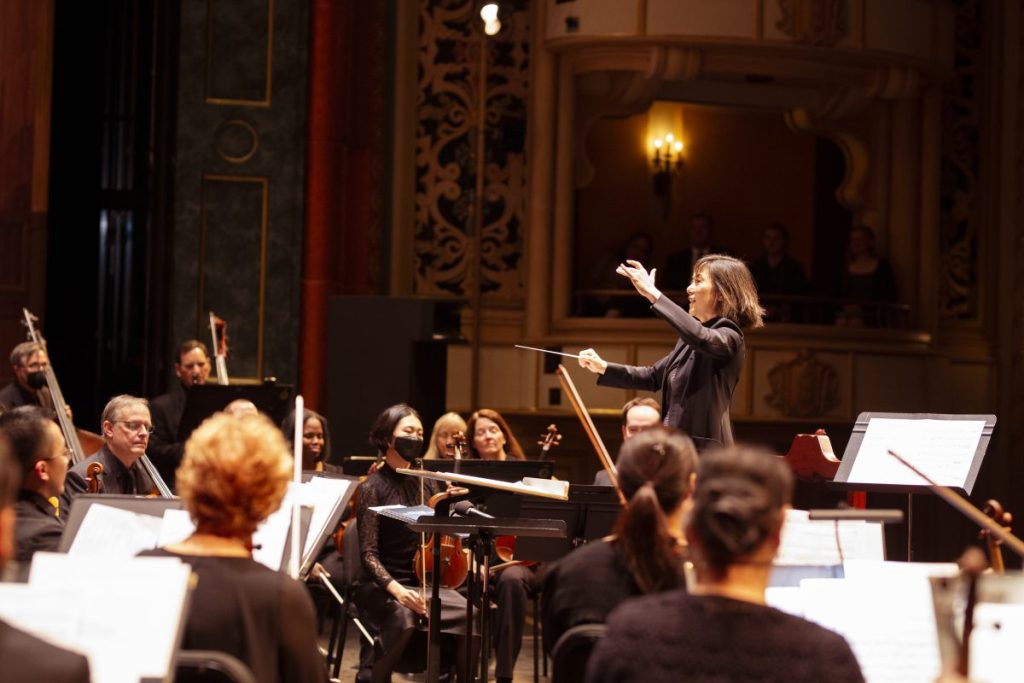Last weekend’s edition in the current Santa Barbara Symphony (SBS) season marked the point when serious symphonic culture took a holiday, and we all up and went to the movies. We’re talking, of course, about the innately crowd-pleasing program with the handle John Williams: A Symphonic Celebration. The timing was ripe: just one week after Williams, 91, added to his nearly record-breaking Oscar nomination list for work on Steven Spielberg’s The Fabelmans.
Essentially a pops concert packed with tunes made familiar in blockbuster films beloved by the masses, the Williams tribute achieved the desired effect of drawing a larger crowd than usual, and a crowd with listeners not necessarily attuned to orchestra concert-going. A roster of fictional heroes filtered into the Granada Theatre, once a multiplex in one phase of its long history, opening archetypally with Superman and including Luke Skywalker, Harry Potter, ET, and Indiana Jones. From the non-fictional hero’s corner came Oskar Schindler, JFK, and Lincoln — themes for which are among Williams’ more musically sublime pieces. Unabashedly heroic musical themes were the order of the concert program.
The SBS orchestra itself was in expected stellar form, led by guest conductor Rei Hotoda, who leads the Fresno Symphony and is engaged in guest conducting work. With its large Los Angeles-based musician base, the SBS includes no fewer than nine rank-and-file musicians who have worked on Williams’ scores. One musician, principal trumpeter John Lewis, recounted having worked on 45 Williams scores. These musicians have, in some measure, planted their sounds in our collective movie-goer ears and minds.
Among the virtues of Williams’ scoring sensibilities is his admirable championing of the orchestral sound palette over digital additives or pop elements heard elsewhere in the scoring scene. With his simple, infectious, but also musically-informed writing and orchestrations, Williams has placed and kept the timeless grandeur of the orchestra in the highly general public forum of the movies.
As Hotoda mentioned at one point, he often called on the Wagnerian principle of using “leitmotif” themes for specific characters (although we didn’t hear the famous example of the ominous two-note shark leitmotif from Jaws). We detect in Williams’ music echoes of and borrowings from western classical legends, including Richard Strauss and the romantics, not to mention such early film scoring models as Erich Korngold.
Still, Williams fans can tend to overstate the composer’s importance in the larger musical scheme beyond Hollywood. When it was suggested by Hotoda and violist Eric Rynearson that John Williams will one day be considered one of the great 20th century composers in the company of Stravinsky and Mahler, one could sense the feel of many eyes rolling among classical music fans in the house.
That said, once we accept at face value what it means to enjoy a John Williams night at the orchestra — especially one fixated on only his movie music, ignoring his impressive “concert music” — the fun and instantly recognizable theme parade begins. There were little surprises along the way, as when the Close Encounters of the Third Kind suite opened with an atonal massing of notes evoking a kind of “Ligeti lite” approach, before sidling up to the famed five-note “leitmotif” of the score (this theme, along with Star Wars, also triggers memories of Bill Murray as a lounge singer taking on those themes on Saturday Night Live.”
As the orchestra capped off the concert’s first half with a party pack of scoring from ET: the Extra-Terrestrial, the music worked its way into a walloping finale. The orchestra gave the Big Moment its due gusto: they didn’t just phone it home.
At the concert’s end, the audience leapt to its feet for standing ovations, and Hotoda cleverly returned for a pair of encores with a multicolor-emitting light saber to replace the standard baton. It was that kind of night. Next month, we return to our regularly scheduled classical programming, sans popcorn.

